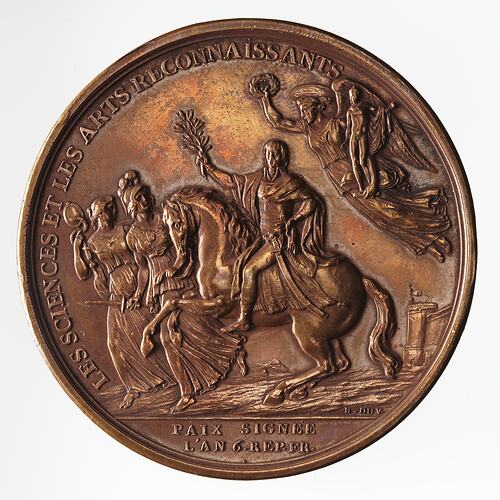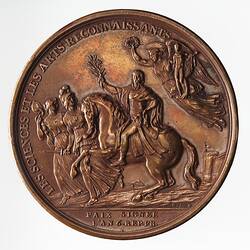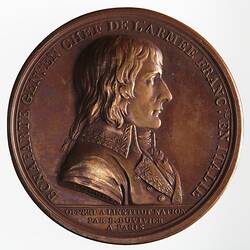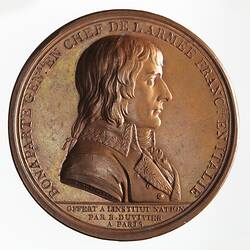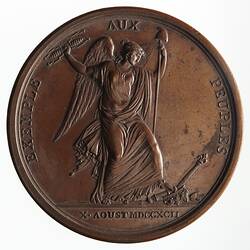Summary
Medal Treaty of Campo Formio: Recognition of the Sciences and Arts, Issued by Napoleon Bonaparte (Napoleon I), France, 1797
Artist: Benjamin Duvivier,
Minted by Paris Mint (?)
Obverse Description
Draped bust of Napoleon facing right; around above, BONAPARTE GENAL. EN CHEF DE L'ARMEE FRANCSE. EN:ITALIE (translation: Bonaparte, General in Chief of the French Army in Italy); in exergue in three lines: OFFERT A L'INSTITUT NATION. / PAR B. DUVIVIER / A PARIS (translation: Presented to the National Institution by B. Duvivier, Paris); on bust truncation, B. DUVIVIER F. (the second 'V' double entered)
Reverse Description
Napoleon on horseback advancing left lifting high an olive branch, the horse is led by Minerva (goddess of war), carrying a sword, and Justice, carrying the cap of Liberty on a staff; Victory flies above crowning Napoleon with a wreath and holding an example of the booty from Italy, the Apollo Belvedere; around above, LES SCIENCES ET LES ARTS RECONNAISSANTS (translation: Arts and Sciences Grateful); in exergue: PAIS SIGNEE L'AN 6. REP. FR. (translation: Peace signed Year VI of the French Republic); artist's name, B. DUV., at right of exergue line
Edge Description
Plain
Significance
In 1797, after being defeated in Italy, Austria was compelled to sign the peace of Campo Formio in which it surrendered Lombardy and Belgium to France and receive in return Venetia, Istria and Dalmatia. Part of the treaty included specimens of art that would be handed over to the French. This medal was prepared by Benjamin Duvivier and presented to the Institute of Sciences and the Arts on the ocasion of the arrival of the art works in Paris (Mudie Scargill, Ann; Medallic History of Napoleon Bonaparte, London, 1820, No. 126, p.161-2). Jones points to Duvivier's portrait of Napoleon "showing him as a revolutionary soldier, with free flowing locks scornful of the wig and powder of the past" as an effort by the artist to regain favour, having by this date lost his position at the Paris Mint. (Jones, Mark; The Art of the Medal, p. 99).
More Information
-
Collection Names
-
Collecting Areas
-
Acquisition Information
Transfer from National Gallery of Victoria (NGV), 15 Mar 1976
-
Date Issued
1797 AD
-
Issued By
-
Artist
-
Series
-
Material
Bronze
-
Axis
12
-
Classification
-
Category
-
Discipline
-
Type of item
-
Dimensions
55 mm (Outside Diameter)
-
Shape
Round
-
References
Hennin 811 Jones 252
[Book] Jones, Mark. 1979. The Art of the Medal., 99 Pages
-
Keywords
